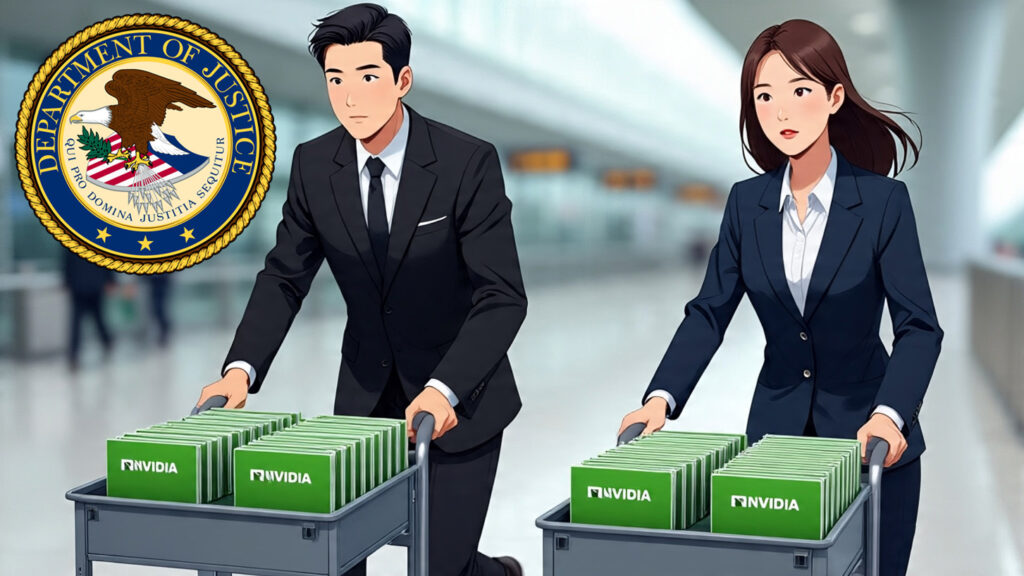Two nationals of China have been arrested in the United States for smuggling top-of-the-range artificial intelligence (AI) chips valued at millions of dollars to China. The US Department of Justice (DOJ) disclosed the arrests on Tuesday, 5th August (local time), stating that the suspects illegally exported controlled technology without the required government licenses.
According to a press release issued by the US Department of Justice, the accused, Chuan Geng and Shiwei Yang, were running a California-based company called ALX Solutions. Over the past three years, the company sent advance GPUs like Nvidia’s H100 and GeForce RTX 4090 from the US to China, bypassing strict export controls.
Nvidia AI chips at the centre of the case
Some of the shipments included Nvidia’s H100 graphics processing units (GPUs). These are among the most advanced GPUs used in AI development and are currently under heavy restrictions by the US government to prevent them from reaching China.
A spokesperson from Nvidia responded to the case, saying that any attempt to smuggle their chips is a “nonstarter.” The company said it only sells its products to trusted partners who ensure that all sales follow export control rules. If any product is illegally exported or diverted, it loses all official service, support, and software updates, the spokesperson added.
Fake customers and suspicious payments
The DOJ says ALX Solutions had only three known employees. Chuan Geng handled the finances, Shiwei Yang was the company’s secretary, and the CEO’s name is still unknown. Mr Geng was a legal permanent resident in California, while Ms Yang had overstayed her visa and was considered an “illegal alien.”
Between October 2022 and July 2025, ALX allegedly sent several shipments to companies in Singapore and Malaysia. However, the DOJ says these locations were just transit hubs to hide the fact that the final destination was China.
Interestingly, ALX didn’t receive payments directly from the shipping companies. Instead, it was paid by businesses based in Hong Kong and China. In one case, a China-based company transferred $1 million to ALX in January 2024.
One invoice from 2023, worth $28.4 million, claimed that Nvidia chips were ordered by a Singapore-based firm. But when US officials investigated, they couldn’t verify the delivery. The company listed in the invoice didn’t even exist at the stated address.
The DOJ also found that neither ALX Solutions nor its employees applied for or obtained an export license from the US Commerce Department. In December last year, one shipment containing restricted chips, including Nvidia H100 and GeForce RTX 4090, was flagged by US customs for further inspection.
Arrest and court appearance
Ms Yang was arrested on Saturday, and Mr Geng turned himself in shortly after. Both appeared in federal court in Los Angeles on Monday, 4th August (local time) They would get up to 20 years in prison if they are found guilty.
Up till now, ALX Solutions does not seem to have an official website. But another website belonging to another company named ALX-Cloud that provides cloud computing solutions claims to be a subsidiary of ALX Solutions.
The chip maker named in the case, Super Micro Computer, stated it is committed to complying with all US export laws. The company would not comment on the current legal action but promised to assist authorities if necessary.
Why the US is restricting AI chip exports to China
This case is part of a broader effort by the US government to stop advanced technology from falling into the hands of its geopolitical rivals, especially China and Russia.
In January 2025, the US introduced strict new rules that limit the export of AI chips to most countries. The regulations are particularly targeted at high-performance chips such as those made by Nvidia and AMD. The aim is to prevent nations such as China from employing AI technology for military applications or mass surveillance.
Only close US allies that follow American security and human rights standards are allowed to buy such technology. The US Commerce Secretary, Gina Raimondo, said the new rules were necessary to protect national security, even if they came with trade-offs.
“Managing national security risks requires trade-offs,” she said in a blog post from the White House. “This rule ensures our allies can access cutting-edge technology while safeguarding our interests.”
The US National Security Advisor, Jake Sullivan, also said that these rules are meant to make sure that the future of AI remains in the hands of the US and its trusted partners. He explained that this is to prevent what happened with chip and battery manufacturing, where the US lost dominance to other countries, from happening again with AI.
The arrest of Geng and Yang shows that the US is taking its chip export laws very seriously and is willing to crack down even on small-scale exporters who try to bypass the system.

